Company Overview / CSR Management
Corporate Philosophy and Yokohama Rubber Group's Approach to CSR
Corporate Philosophy and Yokohama Rubber Group's Approach to CSR
Yokohama Rubber established its corporate philosophy in 1990. It consists of the Basic Philosophy, Management Policies, Action Guidelines, and Corporate Slogan. The Basic Philosophy embodies the types of business where Yokohama Rubber commits itself in all activities. The Management Policies outline basic administrative principles for upper-level management to commitment themselves to. The Action Guidelines are the code of conduct for each employee to comply with.
In 2006, we drew up a medium-term management plan, the Grand Design 100 (GD100), and set a clear target of becoming a global company with one trillion yen in net sales by FY2017. Also, since our Basic Philosophy has been compiled based on the strong awareness of the expectations and needs arising from the international community, the plan places a strong emphasis on CSR by adopting these two basic points; to assert world-class strengths in technologies for protecting the environment, and fostering a customer-oriented corporate culture as our first priority by respecting higher standards of corporate ethics. In 2008, we reformed our corporate structure by establishing the CSR Division, followed by announcing our vision of CSR management both internally and externally. Our vision, to build a trusted identity as a contributing member of the global community, incorporates our desire to change the letter “R” in CSR to “Reliability”, instead of the original “Responsibility.” By doing so, we are hoping to make the concept more accessible and practical in our daily operations.
Incidentally, Yokohama Rubber still maintains the cautionary tale by Suekichi Nakagawa, who was president at the time of the inauguration of our Yokohama Plant (located in Tsurumi-ku, Yokohama City) in 1929 as our Founding Spirit. This tale comprises the balancing of both sociality and economic efficiency; it still greatly relates to today’s notion of CSR management.
The Founding Spirit
1. Production business is a social service. Its purpose is to make people’s lives more convenient and enjoyable. Its aim should be to offer good, useful products at moderate prices.
2. There must be a basic commitment to delivering quality products unrivaled by those of competitors.
3. Management should adhere to the principles of fairness and consideration. The mission of a fair, honest management is to ensure capital, share the fruits of endeavor with its workers, and fulfill its responsibilities to consumers – to act, in other words, rationally.
4. A company should have as few employees as possible and make the best use of the productivity of machines. This is the great secret for improving efficiency.
5. The success or failure of a business depends on how much one is willing to study, and with how much determination, to mutually improve and grow. Accordingly, one must make a great effort.
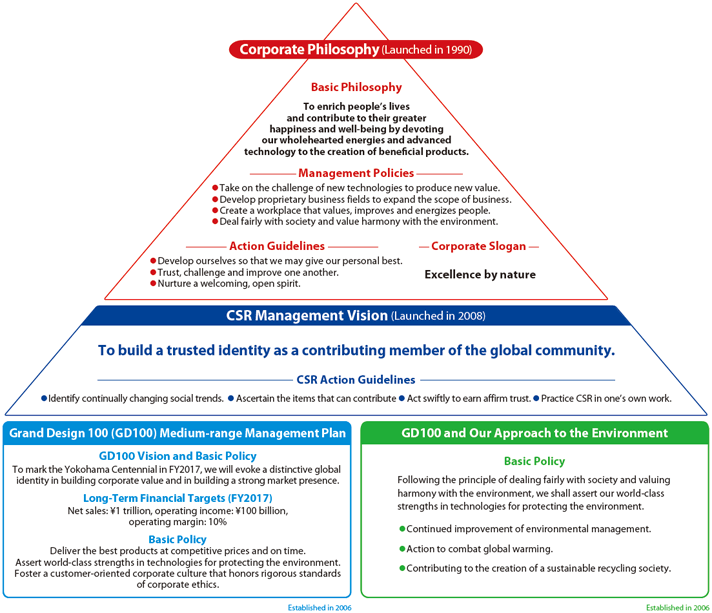
The entire Yokohama Rubber Group including all domestic and overseas subsidiaries observe as action guidelines the 10 Principles of the United Nations Global Compact and the ISO26000 seven core subjects, in accordance with PDCA carried out.
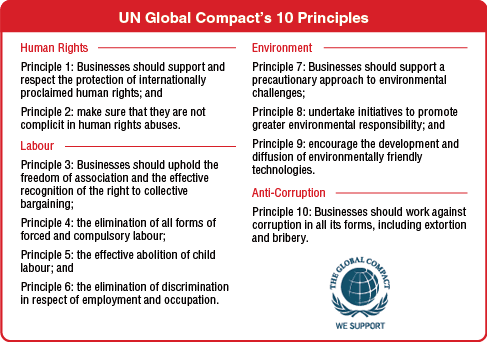
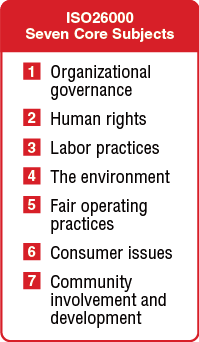
Yokohama Rubber Group Code of Conduct
We, The Yokohama Rubber Co., Ltd. and our Subsidiaries, shall respect human rights and conduct ourselves in a socially responsible manner while promoting the development of a sustainable society, observing applicable laws, regulations and rules applying to our activities both in Japan and abroad and in accordance with the following ten principles. (established in April 2006)
Code of Conduct
Corporate Compliance Committee, Revised Apr.,2006
- We shall strive to gain the confidence of consumers by developing and providing socially beneficial products and services in a safe and responsible manner.
- We shall promote fair and transparent competition and trade in conformity with applicable laws and regulations, business practices and social ethics at home and abroad.
- We shall disclose corporate information actively and fairly while engaging in communication not only with shareholders but also with members of society.
- We shall strive to respect the diversity and individuality of our employees and will promote safe and comfortable workplace environments in order to ensure the mental and physical well-being of our employees.
- We recognize that taking environmental issues into account is an essential part of the activities and sustainability of a corporation and shall therefore take positive action on such issues.
- As “good corporate citizens,” we shall strive to meet the needs of the communities in which we operate, and in realizing our social responsibility to these communities shall not engage in unlawful activities or associate with organizations that promote such activities.
- We shall manage and maintain company property and data responsibly as well as protect the personal data and information of our customers from unnecessary disclosure.
- We shall observe laws and regulations applying to our overseas activities and respect the culture and customs of local communities and strive to carry out our overseas activities in such a way so as to promote and contribute to the development of such communities.
- Management recognizes that they are fully responsible for implementing the spirit and intentions of this Code and thus, shall promote actions company-wide to instill in all employees the importance of observing this Code. Management shall be aware of current circumstances and events both internally and externally and establish an effective internal organizational structure which promotes among our employees a desire to observe and practice corporate ethics.
- When problems of non-compliance with this Code arise, Management shall, without delay, take the initiative in resolving problems and investigate causes and shall take the necessary actions in order to prevent the occurrence of similar problems in the future. Management shall also disclose such information promptly and appropriately in a manner that clearly respects the concept of accountability and responsibility as well as disciplining those individuals responsible for non-compliance regardless of position or status within the organization.
The Yokohama Rubber Co., Ltd. and its Subsidiaries (PDF:159KB)
Mid-Term Management Plan - Grand Design 100 (GD100)
Since the fiscal year of 2006, Yokohama Rubber has launched an initiative called Grand Design 100 (GD100), part of its Mid-Term Management Plan. The purpose of GD100 is to become "a Global Company with a unique presence in terms of both corporate value and market position" by 2017, the 100th anniversary of the company, by targeting JPY 1 trillion in net sales, JPY 100 billion in operating income, and an operating margin of 10%. In order to ensure steady growth, we have the next 12 years until the fiscal year of 2017 into four phases, defining themes, business strategies, and financial targets for each.
Theme of Phase III: Strong and Flexible Growth
Based on the theme of strong and flexible growth for Phase III that commenced during FY 2012, we worked to further strengthen our business foundations while responding flexibly to changes in the external environment in order to establish a foothold for leaping forward from Phase IV onward.
The financial targets established as three-year totals for Phase III are net sales of 1,800 billion yen, operating income of 150 billion yen, and an operating margin of 8.3%. During the final year of FY 2014, we aim for net sales of 630 billion yen, operating income of 60 billion yen, and an operating margin of 9.5%.
Environmental GD100
We are promoting CSR and environmental management by integrating environmental aspects and social aspects into GD100.
GD100 basic policy on the environment
Following the principle of dealing fairly with society and valuing harmony with the environment, we shall assert our world-class strengths in technologies for protecting the environment.
- Continued improvement of environmental management.
- Action to combat global warming.
- Contributing to the creation of a sustainable recycling society.
GD100 guidelines for action on the environment
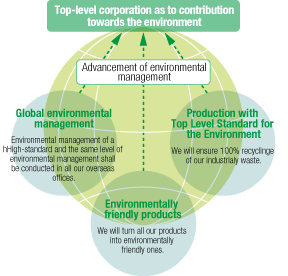 For the sake of future generations and this irreplaceable planet, we shall act to protect the environment.
For the sake of future generations and this irreplaceable planet, we shall act to protect the environment.
- Practice of global environmental management
- We will adopt consistent, high-level environmental management practices at all operations worldwide.
- We will contribute to society using an approach to manufacturing
- We will take action to minimize the environmental impact in all products.
- We will take action to protect the environment as a duty to society by practicing top-level environmentally conscious production
- All industrial waste will be recycled.
- Improvement of communication with society and local communities
Our Stakeholders
Following the establishment of our CSR Division in 2008, we have organized the social responsibility issues we need to address in our day-to-day and future activities, and also we have appointed our stakeholders as listed below. During our selection process, we consulted the GRI Guidelines, ISO26000, and Nippon Keidanren’s Charter of Corporate Behavior, and other descriptions thereto.
Customers
We will enrich people’s lives and contribute to their greater happiness and well-being by devoting our wholehearted energies and advanced technologies; this basic philosophy is our declaration to put our customers first. We seek to develop a corporate culture where the customer’s interests are the top priority.
Employees
We believe that being considerate to the rights and safety of the workers and providing an environment to maximize their potential are the greatest driving forces for a corporation with sustainable growth. This is clearly stated in our management policies that reads, “create a workplace that values, improves, and energizes people”.
Business Partners and Suppliers
We are expanding our businesses by working together with a variety of suppliers and partners who procure raw materials, parts, equipment, etc. By practicing fair and free trade with business partners, we will continue to build relationships of mutual sustainment and being beneficial to each other.
Shareholders and Investors
By taking on any challenges to develop innovative technologies to generate new value, we will realize our sustainable growth and return of reasonable profits. Also, we will be happy to provide any information in an appropriate manner to meet the expectations of all of our stakeholders and investors.
Local Communities
As a globally active business, we relate to local communities in a number of domains – the natural environment, law, culture, customs and the economy. We will strive to build a healthy relationship for various local communities together with our both domestic and overseas offices.
CSR and Environmental Promotion Framework
Twice a year, we hold a CSR Council where our company Chairman and CEO serves as a chairperson, and an Environmental Council where our company President serves as a chairperson. These councils are part of an organizational framework that was set up to discuss and develop plans for addressing the social responsibility issues currently Yokohama Rubber Group is facing, with the ultimate goal to build a trusted identity as a contributing member of the global community. We have three task forces, two sub-councils, and five committees who promote environmental activities as sub-bodies within the Environmental Council. Every year the CSR Council and Environmental Council evaluate the performance of CSR activities carried out by the Group in accordance with the Seven Pillars of Critical Issues and develop plans for improvement in the subsequent fiscal year.
To pursue our effort on practicing consistent and high-level environmental management in all our operations worldwide, we also annually hold a Global Environment Council, which is a gathering by managers from all of our overseas production operations. The council for FY2013 was held on December 11 to engage in discussions focusing on environmental policies and initiatives at the overseas production operations and core distribution subsidiaries. Furthermore, in order to incorporate regional circumstances overseas, in FY 2013 an Environment Council has held by production and sales offices in China in an aim to promote area management. There are plans to hold Environment Council for Thailand and North America during FY 2014 for the global expansion of area management for CSR and environmental management. The Council will also push forward such efforts to promote CSR activities and put into practice consistent and high-level environmental management.
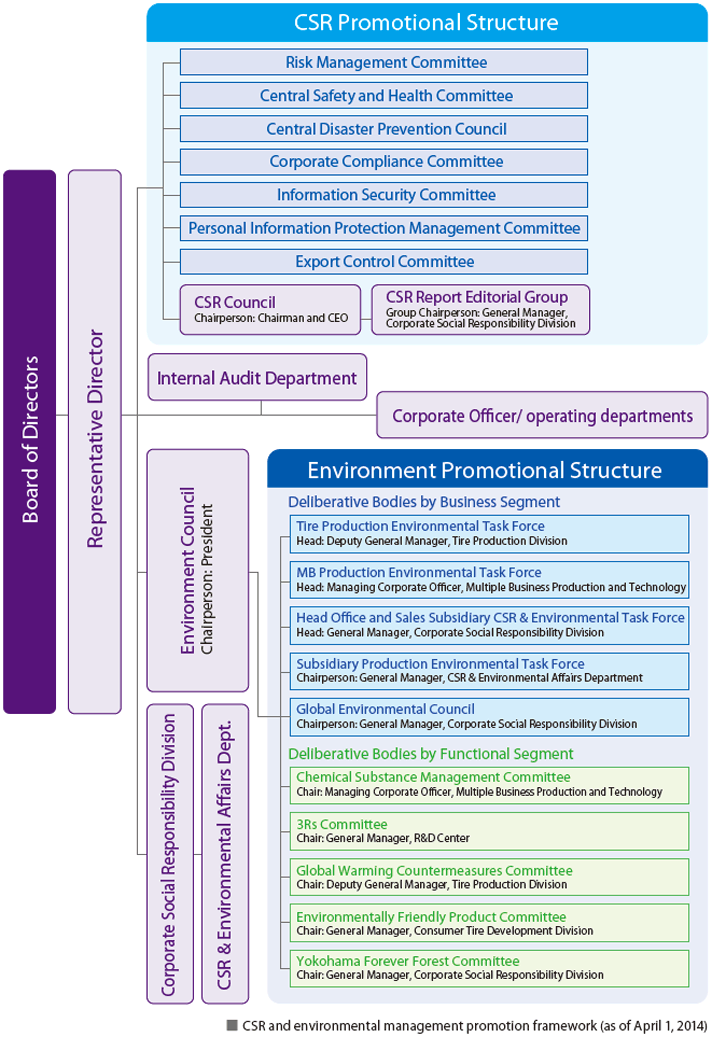
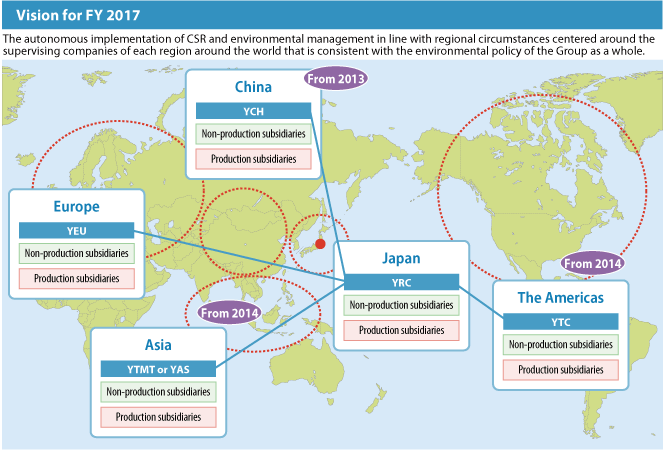
CSR and Environmental Mid- to Long-Term Action Plans
The Yokohama Rubber Group sets medium to long-term and single-year targets in line with the seven core subjects of ISO26000 and manages these issues through PDCA.
Yokohama Rubber has defined seven critical issues to address based on the core subjects of ISO26000.
For each subject, we will manage our PDCA cycle by defining each goal for the mid- and long-term as well as each single year.